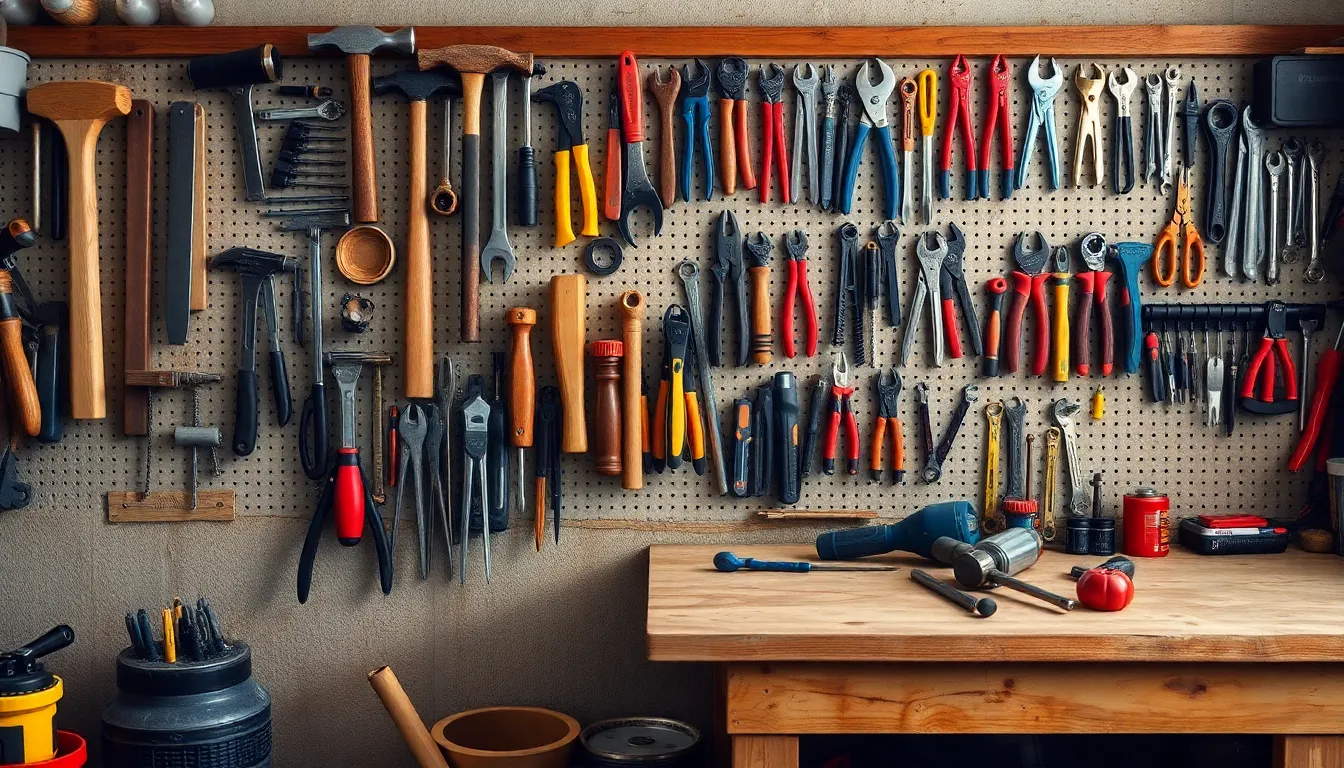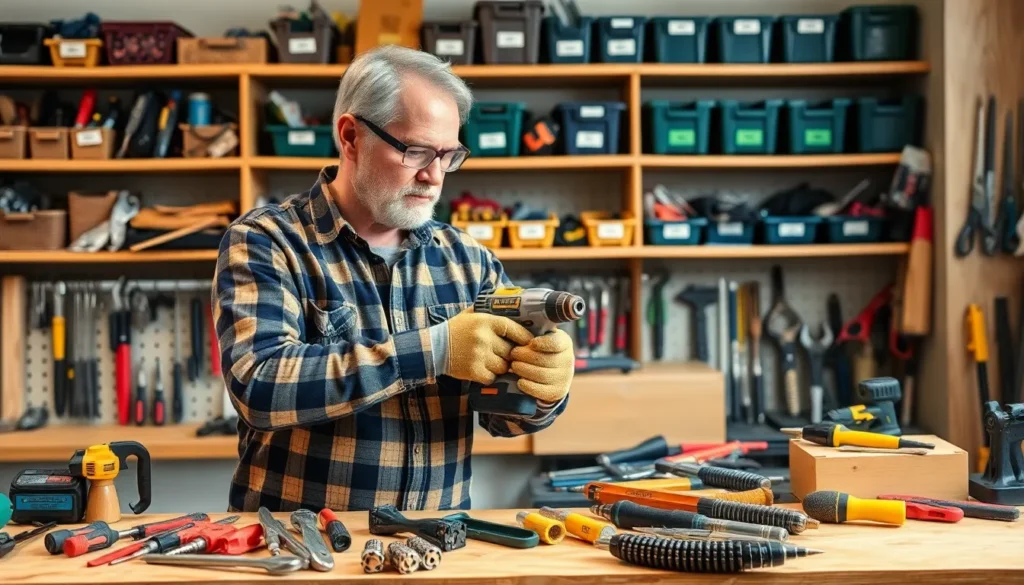Table of Contents
ToggleEvery DIY enthusiast knows that a well-equipped home workshop is the secret sauce to transforming ideas into reality. Whether it’s building that dream bookshelf or tackling a home repair that’s been on the to-do list since the last ice age, the right tools can make all the difference. But let’s be real—navigating the world of tools can feel like trying to find a needle in a haystack, especially when that needle is actually a power drill hiding behind a pile of old paint cans.
Overview Of Tools For The Home Workshop
Essential tools create the foundation for an effective home workshop. They facilitate a range of tasks from simple repairs to complex constructions. Categories of tools include hand tools, power tools, and specialty tools.
Hand tools play a vital role. Common examples include hammers, screwdrivers, wrenches, and pliers. Each tool fulfills specific functions, making them indispensable for various tasks.
Power tools enhance efficiency and precision. Drills, saws, and sanders save time and effort in larger projects. Choosing corded or cordless versions depends on mobility and power needs.
Specialty tools address unique tasks. Examples consist of routers, laser levels, and tile cutters. These tools can significantly raise project quality, enabling more intricate designs and accurate measurements.
Storage solutions are equally important in organizing tools. Tool chests, pegboards, and drawer organizers help locate tools easily. Categorizing tools by type and frequency of use minimizes clutter and streamlines workflow.
Safety equipment complements tool usage. Essential items include safety goggles, gloves, and ear protection. Ensuring proper safety gear protects users from potential hazards associated with various tools.
Maintenance also impacts longevity and performance. Regularly cleaning tools and inspecting them for damage prolongs their usability. Proper storage techniques prevent wear and keep tools in optimal condition.
Investing in quality tools guarantees better results. Selecting versatile and durable options makes a significant difference in project execution. Prioritizing essential tools maximizes the workshop’s functionality and effectiveness.
Essential Hand Tools

Equipping a home workshop with reliable hand tools is vital for tackling various projects effortlessly. These tools enhance both precision and comfort, making tasks more manageable.
Types Of Hand Tools
Common hand tools include hammers, screwdrivers, pliers, and wrenches. Hammers come in different styles, such as claw or sledge, catering to diverse tasks. Screwdrivers, available in flathead and Phillips types, suit various screw designs. Pliers function effectively for gripping and cutting tasks, offering styles like needle-nose and slip-joint. Wrenches assist in fastening nuts and bolts, with options like adjustable wrenches and socket sets. Each tool serves a specific purpose, ensuring a well-rounded toolkit for home projects.
Hand Tool Maintenance
Regular maintenance extends the lifespan of hand tools significantly. Cleaning tools after each use prevents rust and buildup. Sharpening blades on tools like chisels and utility knives maintains cutting efficiency. Inspecting tools for wear or damage before use helps avoid accidents. Proper storage, such as keeping tools in a toolbox or on pegboards, protects instruments from unnecessary wear and tear. Ensuring tools are stored away from moisture preserves their quality and functionality.
Power Tools For Efficiency
Power tools enhance the ability to work efficiently in a home workshop. Choosing the right ones significantly boosts productivity and precision.
Common Power Tools
Common power tools include drills, circular saws, and jigsaws. Drills provide versatility for boring holes and driving screws. Circular saws excel at making rapid cuts in wood, while jigsaws allow for intricate shapes. Other essential tools are sanders, which smooth surfaces, and routers, useful for creating decorative edges. Nail guns expedite fastening tasks and improve overall workflow. Each tool addresses specific needs, making projects more manageable and effective.
Safety Tips For Power Tools
Safety plays a crucial role when using power tools. Always wear protective gear, including goggles and gloves, to safeguard against debris and injuries. Inspect tools before use to ensure they’re in good condition. Maintaining a clutter-free workspace reduces the risk of accidents. Keep hands clear of moving parts while operating a power tool. Follow manufacturer guidelines for proper usage and maintenance. Lastly, disconnect tools when changing accessories or making adjustments to prevent unintended starts.
Specialty Tools
Specialty tools play a crucial role in a home workshop, enhancing the ability to tackle projects that require precision and complexity. These tools enable users to achieve results that standard tools cannot.
Unique Tools For Specific Projects
Unique tools address specific project requirements, making tasks easier. For instance, a router shapes edges on wood, offering detailed design options. Laser levels provide precise alignment for cabinetry or shelving. Likewise, specialty clamps maintain strong grips while working on intricate components. More advanced options include oscillating multi-tools, useful for detail sanding or plunge cuts. Each tool enhances the ability to execute specialized projects accurately.
Tool Storage Solutions
Effective tool storage solutions contribute to a well-organized workshop space. Tool chests with multiple drawers offer ample storage for smaller hand tools. Pegboards allow easy access to commonly used items while keeping them visible. Additionally, wall-mounted racks save floor space and provide a tidy look. Consider labeled bins for storing fasteners and accessories, ensuring quick retrieval. Magnetic strips can also hold metal tools securely within reach. Prioritizing organization helps streamline workflow and boosts workshop efficiency.
Budget-Friendly Options
Finding economical tools for a home workshop doesn’t compromise quality. Many reliable options exist in the budget category.
Hand Tool Sets prove valuable for any workshop. Sets often include essential items like hammers, screwdrivers, and pliers, providing versatility for multiple tasks.
Cordless Drills offer excellent functionality without breaking the bank. Many models provide decent torque and battery life, making them suitable for various projects.
Compact Saws present a cost-effective way to manage cutting tasks. Circular saws deliver precision and power at an affordable price point.
Clamps and Vises enhance stability during projects. Investing in a few sturdy clamps helps secure materials, improving safety while working.
Tool Storage Solutions shouldn’t be overlooked. Budget-friendly options like plastic toolboxes and simple wall-mounted pegboards keep everything organized. These options ensure easy access to tools while maintaining a clutter-free workspace.
Safety Gear remains crucial in a workshop. Affordable goggles and gloves protect users during projects without overspending.
DIY Tool Restorations can also save money. Restoring old tools often involves simple cleaning and minor repairs, thus extending their life significantly.
Choosing budget-friendly tools doesn’t mean sacrificing performance. It allows more projects to be tackled without excessive costs. By prioritizing essential tools, enthusiasts create effective workshops that support their DIY endeavors while respecting financial constraints.
A well-equipped home workshop transforms DIY dreams into reality. With the right tools and effective organization, enthusiasts can tackle projects with confidence and precision. Investing in quality hand tools and power tools not only enhances efficiency but also ensures safety during use.
Proper storage solutions play a crucial role in maintaining an orderly workspace, allowing for quick access to tools when needed. By prioritizing safety equipment and regular maintenance, users can prolong the lifespan of their tools and minimize hazards.
Ultimately, creating a functional workshop doesn’t have to break the bank. Budget-friendly options are available that deliver quality and performance. With the right approach, anyone can cultivate a workshop that inspires creativity and productivity.




